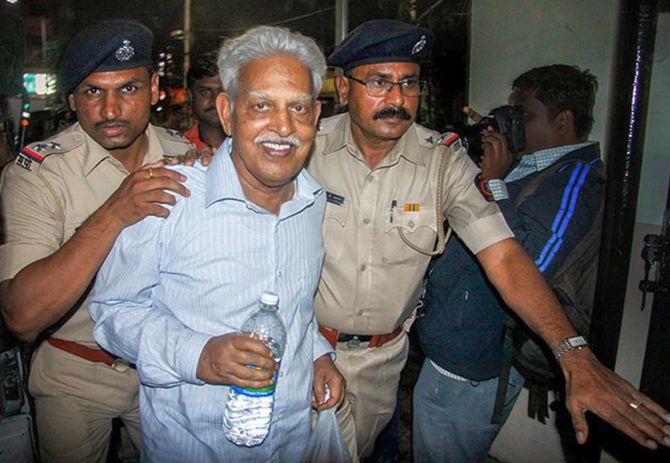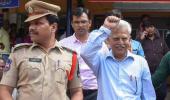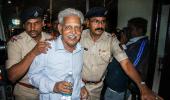Granting interim bail for six months to poet Varavara Rao on medical grounds, the Bombay high court said on Monday though he was accused of serious offences under the stringent Unlawful Activities Prevention Act, the court must take a humanitarian approach on account of his ill health.

A bench of Justices SS Shinde and Manish Pitale said that though UAPA imposes stringent restrictions on grant of bail under ordinary circumstances, in Rao's case, the court could not be a "mute spectator" to the deteriorating health condition of the octogenarian, an accused in the Elgar Parishad-Maoist links case.
It imposed a string of conditions while granting bail to Rao, who is in jail for more than two years now.
"We are of the opinion that this court, as a Constitutional Court, cannot be a mute spectator to the undertrial being sent to prison and then to Government Hospitals where his health deteriorates further, to be ultimately shifted to the Private Superspeciality Hospitals, upon intervention of courts.
"And such movements of the undertrial continue back and forth only because his bail application has been turned down on merits under Section 43D(5) of the UAPA," it said.
The bench went on to observe that persons booked under UAPA, an anti-terror act, could be granted bail if their continued incarceration was "endangering" their lives.
"The onset of old age and concomitant debilitating effect on the mental and physical conditions is an aspect which assumes great significance in the context of keeping such old aged persons behind bars," the bench said about Rao.
The 82-year-old poet-activist suffers from a host of ailments, including symptoms of dementia, as per his lawyers.
"Even if such old aged prisoners with various health conditions are accused of serious offences, the question is as to whether they can be forced to live (in) a subhuman existence behind bars, only because they stand accused of serious offences?" the bench said.
It noted that the NIA was yet to frame charges in the 2017-18 Elgar Parishad-Maoist link case, in which more than a dozen persons, activists and academicians, have been named accused.
In its 92-page judgement, the HC said around 200 witnesses were to be examined in the case and there was no word on when the trial will begin.
The court rejected the NIA's argument that permitting Rao to be released on bail to protect his constitutional right to life under Article 21 of the Constitution would lead to several more similar pleas.
"Merely because there is a possibility of filing of petitions under Article 226 of the Constitution of India for release of prisoners from custody on health grounds, it cannot be said that this court ought not to consider cases where such grounds are genuinely made out," the judges said.
The court, however, took note of the NIA's apprehensions of the probe being affected if Rao was let out on bail, and imposed several stringent conditions on his bail. It directed Rao, who hails from Telangana, to stay in the city, within the Mumbai NIA court's jurisdiction, and prohibited him from establishing contact with his co-accused or any persons engaged in activities such as those that led to the FIR in the case.
"We feel that although the material on record does show that the health condition of the undertrial is precarious, sending the undertrial back to where he belongs, is fraught with the risk of his presence being used by those allegedly associated with him to seek to revive the nefarious activities," the HC said.
This court cannot rule out such a contingency and, therefore, it would be appropriate to impose such conditions as would be necessary for ensuring that the undertrial on his own or those allegedly associated with him do not take undue advantage of the situation, which would ultimately adversely affect the trial," it said.
The HC directed Rao to make fortnightly WhatsApp video calls to the nearest Mumbai police station, and prohibited large gatherings or a large group of visitors from meeting Rao while he was out in bail.
The HC prohibited Rao from making any statements related to the case before the print or electronic media.
The bench also dismissed the Maharashtra government's submission that once discharged from the Nanavati Hospital, a private facility, Rao would be shifted to the prison ward of the state-run JJ Hospital in Mumbai.
The HC went on to say given the material on record, it had concluded that sending Rao back to the Taloja central prison (in Navi Mumbai) where he was lodged as an undertrial, before he was shifted to the Nanavati Hospital, would "certainly endanger his life" and breach his fundamental right to health and life.
The bench noted that in the past, Rao's family had to approach court to get information on his health condition while in prison.
It also noted that while Rao continued to suffer from multiple ailments in the prison and even contracted the COVID- 19 infection, he was shifted to the Nanavati Hospital only after the HC's intervention.
"The undertrial's (Rao's) repeated admissions to Government facilities which have proved to be inadequate (in the past), would lead to the undertrial or his relatives repeatedly approaching courts for appropriate directions for dealing with deterioration of his health if he is put back in custody," the bench said.
"In the said process, possibility of casualty cannot be ruled out," the judges said.
The HC referred to the submission made by Rao's counsel, senior advocate Indira Jaising, on for how long was Rao likely to live and what would continued incarceration mean for someone who was 82.
"How much life of the undertrial now remains also assumes some significance," the HC said.
"Admittedly, the undertrial is about 82 years old, suffering from health ailments noted above, requiring support from his immediate relatives in order to have some semblance of normalcy during whatever period of life now remains," it said.
While holding that Rao's was a fit case for grant of relief, the HC said it would be abdicating its constitutional duty as a protector of human rights and right to health covered under right to life guaranteed by Article 21, if it didn't grant Rao bail.
The court directed Rao to either surrender before the NIA court or to apply to the HC for extension of bail once the six-month period was over.
It dismissed the NIA counsel, Additional Solicitor General Anil Singh's request for a stay on the bail order for three weeks.
The HC said once the Nanavati hospital had declared Rao fit to be discharged, and once the court had granted him bail, it could not send him back to the Taloja prison.
The HC directed Rao to furnish a personal bond of Rs 50,000 and two sureties of the like amount.
On February 1, the HC had closed all arguments in the case and reserved its verdict on Rao's medical bail plea and his wife Hemlatha's writ petition that alleged a breach of her husband's fundamental rights due to inadequate medical care and his continued incarceration.
Rao has been in custody since August 28, 2018.
The case pertains to alleged inflammatory speeches made at the 'Elgar Parishad' conclave held in Pune on December 31, 2017, which, the police claimed, triggered violence the next day near the Koregaon-Bhima war memorial located on the outskirts of the western Maharashtra city.
The police have claimed the conclave was organised by people with alleged Maoist links.










